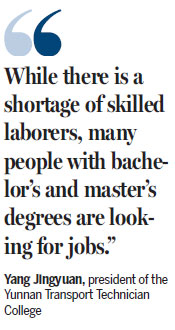New industrial era boosts technical schools
By Hou Liqiang and Li Yingqing | China Daily | Updated: 2017-10-31 07:45
Nearly 20 years after the sector entered a decline, skills-based learning is making a comeback, as Hou Liqiang and Li Yingqing report from Kunming.
The prospects for the nation's vocational schools, the traditional centers of technical education, are becoming brighter as a result of government calls for a renewal of the "Spirit of Craftsmanship" and the growing influence of the Made in China 2025 initiative.
However, although the number of enrollments is rising, vocational schools are still failing to attract quality students, and many young people only consider them as a last resort if they fail to gain a place at university.
| Ma Fuxiang checks an engine during a vehicle maintenance course at Yunnan Transport Technician College in Kunming, Yunnan province. Photos by Hou Liqiang / China Daily |
| A student practices embroidery at Yunnan Technician College in Kunming. |
| A woodworker in Kunming displays his carving skills at an exhibition. |
Experts are concerned that prejudice against the schools will hinder attempts to establish teams of skilled workers to implement the initiative, which was introduced in 2015 to improve manufacturing innovation, strengthen the industrial base and promote breakthroughs in the high-tech sector.
Moreover, they say a lack of qualified teachers could exacerbate the situation.
The problem has its roots in reforms to technical education that started at the turn of the century when the government abolished a number of support policies.
Those advantages included free tuition for students, who were also given subsidies and were guaranteed jobs when they successfully completed their courses.
Traditionally, the schools specialized in subjects such as auto maintenance, welding and woodworking.
Now, however, they are now increasingly focused on advanced technologies, such as computer-aided design and the use of numerically controlled machine tools.
"Before 2000, we never had to worry about recruitment," said Yang Jingyuan, president of the Yunnan Transport Technician College in Kunming, Yunnan province.
In the aftermath of the reforms, the technical education sector began to wane and the bustling college, which covered 80 hectares, was almost deserted, Yang said.
The reforms saw technical schools lose most of the advantages they had enjoyed, meaning they either had to adapt to the new conditions - a total absence of government support - or die.
Yang recalled that as the number of students plummeted, every member of staff was mobilized as part of a recruitment drive.
However, their efforts failed and soon there were just 600 students on the campus rather than the full complement of 4,500.
"We had to go to high schools far and near to recruit students, but we were often given the cold shoulder," he said.
High school principals were contacted so frequently that a joke quickly began to do the rounds: "Special precautions should be taken against fire, thieves and technical school recruitment officers."
Positive change
Now, the growing demand for technical skills is resulting in further changes, this time of a positive nature.
"Before 2000, students who wanted to enroll at our college were accepted without consideration of academic performance. Now, a minimum entry score has been set, and enrollment numbers have risen substantially. The extended college now has 11,000 students and the number is expected to rise to 12,000 this year," Yang said. "Almost all of our students are offered jobs before they graduate."
He believes the change is the result of the importance the central leadership has attached to technical education in recent years and a rise in demand for suitably qualified workers.
In the guidelines for a two-day national conference on vocational education in June 2014, Xi Jinping emphasized that local governments should prioritize its development to facilitate the Chinese Dream of national rejuvenation.
Premier Li Keqiang spoke to the delegates before the conference began.

Li echoed Xi's calls for more training programs for skilled technical workers to boost the economy and employment numbers, and pledged to reform technical education and increase government support.
During General Secretary Xi Jinping's report to the 19th National Congress of the Communist Party of China on Oct 18, he underlined the growing importance of technical education, saying: "We will build an educated, skilled and innovative workforce, foster respect for model workers, promote quality workmanship and ensure that taking pride in labor becomes the norm, and the pursuit of excellence is valued as a good work ethic."
At the WorldSkills General Assembly held in Dubai on Oct 13, Shanghai was chosen as the venue for the 2021 WorldSkills Competition, a global event that seeks to promote greater recognition of skilled workers and encourage young people to work in the industrial sector. Xi sent a message to support China's bid.
Yang, the principal in Kunming, said his school now enjoys unprecedented financial support from the government, which will invest 405 million yuan ($61 million) in the college by 2020, far more than the total investment it has gained in the 30 years since it was founded.
China's economic transition from traditional manufacturing to a greater reliance on the high-tech sector will trigger demand for skilled personnel, according to Yang.
"While there is a shortage of skilled laborers, many people with bachelor's and master's degrees are looking for jobs. The development of the real economy will require skilled workers," he said.
Recruitment rising
According to the Ministry of Human Resources and Social Security, the number of technical schools fell from 2,545 at the end of 2015 to 2,526 at the end of last year, but the number of students in them rose by 10,000 to 3.23 million. It was the first time since 2013 that recruitment at the nation's technical schools had risen.
In 2003, five technical schools in Baoshan, Yunnan, that had failed to attract enough students were merged to form the Baoshan Technician College.
Although the new school only recruited 500 students in its first year, it now has about 3,000 enrollments every year, and the government is helping to fund construction of a new campus.
Yang Fagen, the president, said the college has been given a loan of 620 million yuan to build the new facility, and plans to spend 120 million yuan of the total on state-of-the-art equipment.
The government has also given the college at least 10 million yuan in each of the past three years.
However, there is still a dearth of suitable teachers nationwide.
"Most teachers at technical schools are university graduates. They are knowledgeable, but lack the hands-on experience required for technical education. It can be hard for students of these teachers to meet the needs of modern industry," Yang Fagen said.
According to He Liangping, deputy head of the Professional Capacity Building Department at the Ministry of Human Resources and Social Security, more than 5.3 million students have graduated from technical schools since 2012, and the employment rate for these graduates is consistently higher than 97 percent.
The problem is that while the government is attaching great importance to technical education, people still usually prefer to study at universities than at technical schools.
The situation is a result of the country's talent evaluation system because a bachelor's degree is often the threshold requirement for recruitment, but technical schools don't offer degree-level education, he said.
Meanwhile, the poor treatment that blue-collar workers experience has also contributed to the problem.
In 1960s and '70s, senior skilled workers enjoyed a similar status to the deputy head of a factory, but that is no longer the case. If blue-collar workers enjoyed higher social and employment status, people would change their minds and more students would opt to attend technical schools, he said.
Yang Jingyuan, the principal at Yunnan Transport Technician College, has seen some movement in that direction, noting that a growing number of students have declined offers from universities and opted to study at his college instead.
Last year, 17 undergraduates at universities in Yunnan abandoned their studies and enrolled at the college.
In 2014, when Ma Fuxiang was halfway through a university degree in finance and securities, he decided to transfer to Yunnan Transport Technician College to study vehicle maintenance and repair.
"Many people look down on technical schools. I was kind of affected by that view when I graduated from senior high school and chose to go to university," the 23-year-old said.
"If I had continued my study of finance and securities, I could probably have got a job in an office rather than as a sweaty blue-collar worker, but I really want to follow my own interests," he said.
Contact the writer at houliqiang@chinadaily.com.cn
(China Daily 10/31/2017 page6)



























